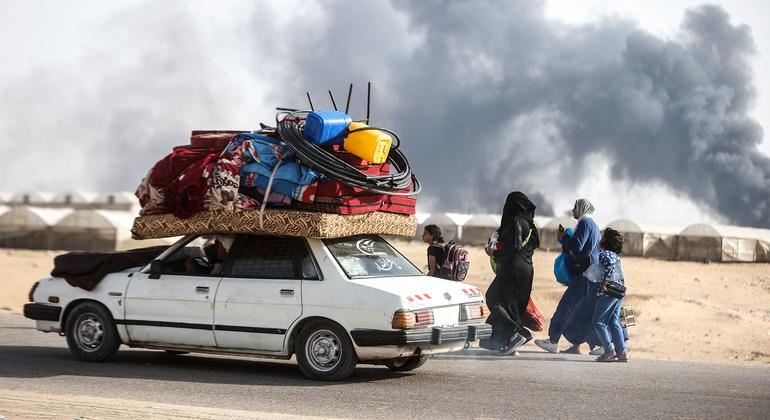The city of Rafah on Gaza’s southern border with Egypt had been home to well over a million forcibly displaced by nearly eight months of daily bombardment by the Israeli military, in response to Hamas-led terror attack in southern Israel on 7 October.
“Thousands of families now shelter in damaged and destroyed facilities in Khan Younis, where UNRWA keeps providing essential services, despite increasing challenges. Conditions are unspeakable,” the UN agency said in a post on X, formerly Twitter.
Biden move
The development comes three days since US President Joe Biden unveiled a ceasefire proposal based on a phased end to the war, reportedly involving the withdrawal of Israeli forces from built-up areas, the release of Israeli hostages and Palestinian prisoners, along with a plan for Gaza reconstruction.
According to UNRWA, thousands of families have been forced to seek shelter in badly damaged buildings in Khan Younis. The city, which is just north of Rafah, is estimated to be home to some 1.7 million people. All 36 of UNRWA’s shelters in Rafah are now empty, it reported.
The UN agency has continued to provide basic humanitarian relief despite the increasingly difficult conditions, illustrated by one photograph of a young girl sitting alone on a rubble-strewn stairwell and another showing huge mounds of rubble and twisted metal next to a largely unscathed building.
Some 690,000 women and girls are believed to lack basic menstrual hygiene kits, privacy and drinking water, UNRWA said.
No place for a baby
Highlighting the daily struggles faced by extremely vulnerable people in Gaza, UNRWA cited the UN Population Fund (UNFPA) estimate that around 18,500 pregnant women have been forced to flee Rafah. “Around 10,000 more remain there in desperate conditions,” the UN agency said on X. “Access to healthcare and maternal supplies is minimal. Mothers’ and babies’ health is at risk.”
‘Beyond crisis’
Echoing those deep concerns, the UN World Food Programme (WFP) said that there was now “ little we can do for the people still in Rafah”, where roads are “unsafe, access limited, and most of our partners and other humanitarian agencies have been displaced”.
In an alarming update on the exodus from Rafah since the escalation of the Israeli military operation there, a senior WFP official warned that public health concerns were now “beyond crisis levels”, while “the sounds, the smells, the everyday life, are horrific and apocalyptic”.
People have “fled to areas where clean water, medical supplies and support are insufficient, food supply is limited, and telecommunications have stopped”, said Matthew Hollingworth, WFP Country Director in Palestine.
Palestine recognition call
In support of repeated international calls for an immediate ceasefire, top human rights experts urged all countries to recognize the State of Palestine, as 146 UN Member States have done already.
“This recognition is an important acknowledgement of the rights of the Palestinian people and their struggles and suffering towards freedom and independence,” the experts said in a statement on Monday.
They noted that the State of Palestine – formally declared by the Palestine Liberation Organization (PLO) on 15 November 1988 – claimed sovereignty over the remaining parts of historic Palestine that Israel occupied in 1967: the West Bank including East Jerusalem and the Gaza Strip.
As of 28 May 2024, the State of Palestine has been recognized by the majority of UN Member States, including most recently Ireland, Norway and Spain.
The rights experts, who are not UN staff but report to the Human Rights Council, insisted that Palestine must be able “to enjoy full self-determination, including the ability to exist”.
These rights are “a pre-condition for lasting peace in Palestine and the entire Middle East – beginning with the immediate declaration of a ceasefire in Gaza and no further military incursions into Rafah”, they maintained.
Highlighting the most recent ruling by the UN’s top court ordering Israel to stop military operations in Rafah, the experts added that the arrest warrants sought by the Prosecutor of the International Criminal Court against the Israeli Prime Minister, Minister of Defence and Hamas leaders on suspicion of war crimes were “a promise of accountability and an end to impunity in the occupied Palestinian territory”.



